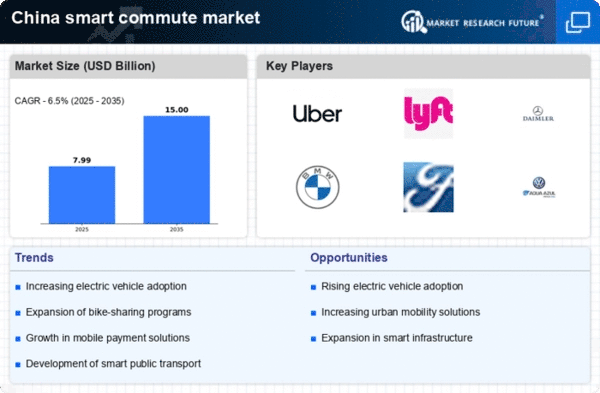Government Policies and Incentives
Government policies play a crucial role in shaping the smart commute market in China. The central government has introduced various initiatives aimed at promoting sustainable transportation solutions. For instance, subsidies for electric vehicles (EVs) and investments in public transport infrastructure are designed to reduce reliance on traditional fossil fuel-based commuting. In 2025, it is estimated that over 30% of new vehicles sold in urban areas will be electric, driven by these policies. Additionally, local governments are implementing smart traffic management systems to alleviate congestion and enhance public transport efficiency. The smart commute market is likely to benefit from these initiatives, as they create a conducive environment for the adoption of smart commuting technologies. The alignment of government objectives with market needs suggests a promising trajectory for growth.
Urbanization and Population Growth
The rapid urbanization in China is a pivotal driver for the smart commute market. As urban populations swell, the demand for efficient transportation solutions intensifies. In 2025, urban areas in China are projected to house over 60% of the population, leading to increased congestion and longer commute times. This scenario necessitates innovative commuting solutions that leverage technology to optimize travel efficiency. The smart commute market is responding by developing integrated platforms that facilitate real-time data sharing and route optimization. Furthermore, the Chinese government has been investing heavily in smart city initiatives, which include advanced public transport systems and smart traffic management. This investment is expected to reach approximately $100 billion by 2026, further propelling the growth of the smart commute market.
Environmental Awareness and Sustainability
Growing environmental awareness among the Chinese populace is driving the smart commute market. As concerns about air quality and climate change escalate, there is a marked shift towards sustainable commuting options. In 2025, surveys indicate that approximately 70% of urban residents prioritize eco-friendly transportation methods. This trend is prompting the smart commute market to innovate solutions that minimize carbon footprints, such as electric public transport and bike-sharing programs. The Chinese government is also promoting green initiatives, aiming for a 20% reduction in urban transport emissions by 2030. This alignment of consumer preferences with governmental goals suggests a robust market for sustainable commuting solutions, potentially leading to increased investments in green technologies.
Integration of Multi-Modal Transport Systems
The integration of multi-modal transport systems is emerging as a key driver for the smart commute market in China. As cities expand, the need for seamless connectivity between various modes of transport becomes increasingly critical. In 2025, it is anticipated that over 50% of urban commuters will utilize multiple transport modes in a single journey. The smart commute market is responding by developing platforms that facilitate easy transitions between buses, subways, and shared mobility services. This integration not only enhances convenience for users but also optimizes overall transport efficiency. Furthermore, the Chinese government is investing in infrastructure that supports multi-modal transport, with an estimated budget of $50 billion allocated for the next five years. This strategic focus on connectivity is likely to bolster the growth of the smart commute market.
Technological Advancements in Mobility Solutions
Technological advancements are significantly influencing the smart commute market in China. Innovations such as artificial intelligence (AI), big data analytics, and the Internet of Things (IoT) are being integrated into transportation systems to enhance user experience and operational efficiency. In 2025, it is projected that the adoption of AI in traffic management could reduce congestion by up to 20%, thereby improving commute times. The smart commute market is witnessing the emergence of mobile applications that provide real-time updates on public transport schedules and traffic conditions. These applications not only facilitate better planning for commuters but also encourage the use of public transport over private vehicles. As technology continues to evolve, the potential for further enhancements in commuting solutions appears substantial.
















